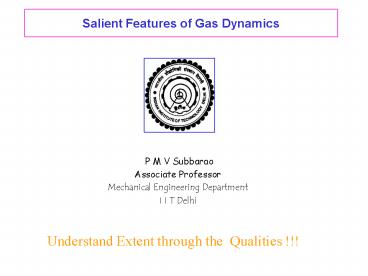Salient Features of Gas Dynamics - PowerPoint PPT Presentation
1 / 11
Title:
Salient Features of Gas Dynamics
Description:
Title: PowerPoint Presentation Author: abc Last modified by: Dr Subbarao Created Date: 7/30/2003 5:45:36 AM Document presentation format: On-screen Show – PowerPoint PPT presentation
Number of Views:65
Avg rating:3.0/5.0
Title: Salient Features of Gas Dynamics
1
Salient Features of Gas Dynamics
- P M V Subbarao
- Associate Professor
- Mechanical Engineering Department
- I I T Delhi
Understand Extent through the Qualities !!!
2
Gas Dynamics of Re-entry
- A range of phenomena are present in the re-entry
of a vehicle into the atmosphere. - This is an example of an external flow.
- Bow shock wave Suddenly raises density,
temperature and pressure of shocked air consider
normal shock in ideal air - ro 116 kg/m3 to rs 664 kg/m3 (over five
times as dense!!) - To 300 K ! Ts 6100 K (hot as the sun's
surface !!) - Po 1.0 atm ! Ps 116.5 atm (tremendous force
change!!)
3
Modern Spacecrafts
4
Rentering Space Craft
5
De Laval Nozzle
- High Speed flows often seem counter-intuitive
when - Compared with low speed flows
- Example Convergent-Divergent Nozzle (De Laval)
- In 1897 Swedish Engineer Gustav De Laval
designed A turbine wheel powered by 4- steam
nozzles. - De Laval Discovered that if the steam nozzle
first narrowed, and then expanded, the efficiency
of the turbine was increased dramatically. - Furthermore, the ratio of the minimum area to
the inlet and outlet areas was critical for
achieving maximum efficiency Counter to the
wisdom of the day.
6
De Laval Nozzle Initial Trials
- Mechanical Engineers of the 19th century were
Primarily hydrodynamicists . - That is they were Familiar with fluids that were
incompressible liquids and Low speed gas flows
where fluid density was Essentially constant - Primary Principles are Continuity and
Bernoullis Law
7
Incompressible De Laval Nozzle
When Continuity and Bernoulli are applied to a
De Laval Nozzle and density is Assumed constant
High Pressure Inlet
pI VI AI r
pt Vt At r
At Throat
Pressure Drop Velocity Increases
Continuity
Bernoulli
classic Venturi
8
Incompressible De Laval Nozzle
High Pressure Inlet
pI VI AI r
pe Ve Ae r
pt Vt At r
At Exit
Pressure Increases Velocity Drops
Continuity
Bernoulli
9
De Laval Nozzle Conclusions A Truth
High Pressure Inlet
pI VI AI r
pe Ve Ae r
pt Vt At r
- But De Laval Discovered that when
- the Nozzle throat Area was adjusted downward
until the pressure ratio became pt / pI lt 0.5484 - then the exit Pressure dropped (instead of
Rising compared to the throat pressure). - And the exit velocity rose (instead of dropping)
- Which is counter to What Bernoullis law predicts
- he had inadvertently ,,, Generated supersonic
flow!
Fundamental principle that makes rocket motors
possible
10
Salient Features of Gas Dynamics
- A Complete Fluid Mechanics.
- Sudden transfer of energy from one form to
another form. - Shock kinetic (ordered) to thermal (random).
- Expansion Wave Thermal to Kinetic.
- Introduces inviscid entropy/vorticity layers.
- Momentum boundary layer
- occurs in thin layer near surface where velocity
relaxes from freestream to zero to satisfy the
no-slip condition. - Necessary to predict viscous drag forces on
body. - Thermal boundary layer
- As fluid decelerates in momentum boundary layer
kinetic energy is converted to thermal energy - Temperature rises can be significant (gt 1000 K)
11
- Caloric gas behavior to Non-Caloric gas behavior.
- vibrational relaxation effects
- energy partitioned into vibrational modes in
addition to translational - lowers temperature that would otherwise be
realized - important for air above 800 K
- unimportant for monatomic gases
- Perfect gas behavior to Imperfect gas behavior.
- dissociation effects
- effect which happens when multi-atomic molecules
split into constituent atoms O2 totally
dissociated into O near 4000 K. - N2 totally dissociated into N near 9000 K.
- For T gt 9000 K, ionized plasmas begin to form
- Vibrational relaxation, dissociation, and
ionization can be accounted for to some extent by
introducing a temperature-dependent specific heat
cv(T)































